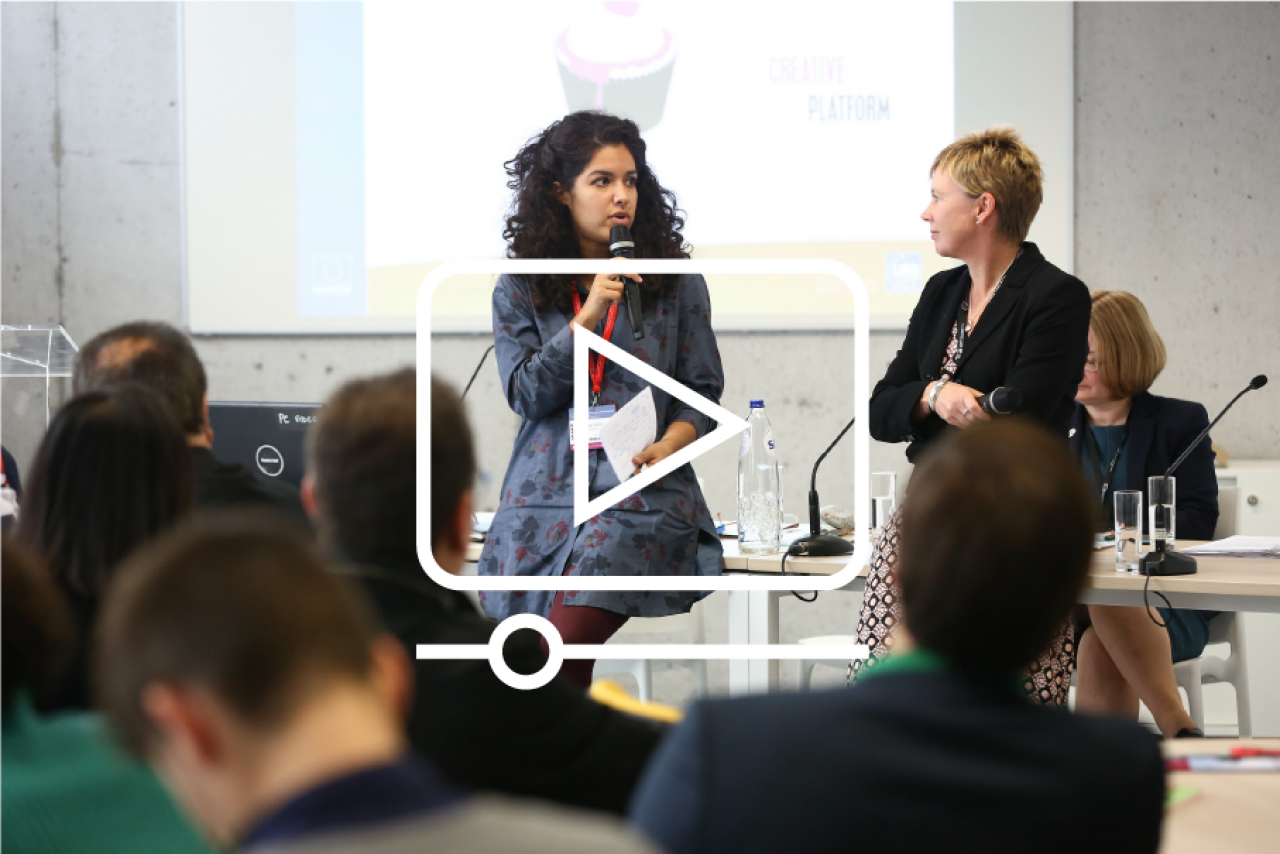
CSI Europe Regulation Conference Report
TechRevolution, an URBACT Transfer Network, builds on the work done so far and provides an opportunity for 7 cities from across the EU to really get under the skin of what Barnsley has achieved, to study each and every element in a safe and honest space, to consider their own local contexts and strategic priorities and then to adapt different aspects of what Barnsley has done within their local setting. It is hoped that over the next 2 years they will be able to really benefit from lessons learnt in Barnsley and revolutionise the way that they approach digital and tech job creation and entrepreneurship so as to grow more and better jobs for local citizens.
This article starts with a short introduction to the good practice, goes on to introduce the TechRevolution network, showcases two of the transfer cities and sets out some initial thoughts on how the network will achieve impact.
We need to talk about Barnsley
A former mining town in the North of the UK with a population of around 240,000, Barnsley lost tens of thousands of jobs through contraction of traditional industry and at first really struggled to understand how it might build a new economy. For over 10 years, the council has been committed to growing higher value jobs, particularly within its creative, tech and digital sectors. The good practice comprises 2 main pillars:
- Enterprising Barnsley - a successful business support programme
- The Digital Media Centre (DMC)- a landmark hub for creative and digital business in the town centre
Through the success of these interlinked activities, Barnsley has also been able to spin out a number of new initiatives and these are also important in the context of the transfer network. So, for the purpose of the transfer network, the good practice is defined as follows:
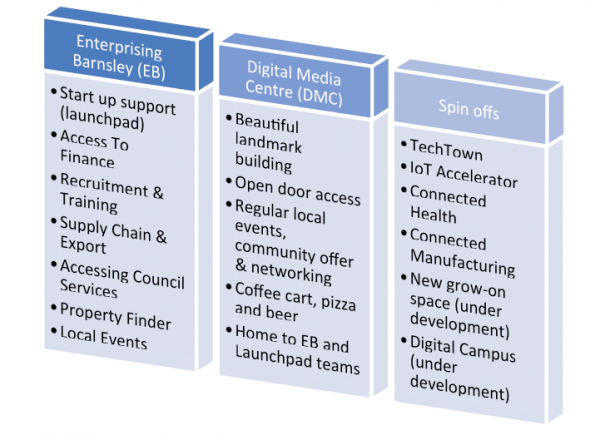
|
Key achievements
|
Watch the interview with Tracey Johnson on Barnsley’s Good Practice the Digital Media Center.
From Coal to Code through TechTown
From 2015 to 2018, Barnsley led the TechTown URBACT Action Planning Network, which focused on what medium sized cities can do to create digital jobs, whether through entrepreneurship, digitalisation or disruption of existing industry. The URBACT methodology, the TechTown Local Group and an intensive and fruitful transnational exchange programme enabled Barnsley to structure some potentially difficult discussions with local and regional tech and digital stakeholders. Together they co-created an Action Plan which was launched in June 2018 and is intrinsically linked with the good practice. Positioning itself at the heart of a web of valuable connections locally, regionally and internationally makes the DMC and its projects more relevant and meaningful for the support of companies and people, as well as ensuring awareness of sector trends and developments.
The TechTown Action Plan sets out the pathway for the creation of a Digital Campus that will help to continue to develop the sector and commits to a series of co-created actions around A Digital Place, Digital People, Digital Partnerships and Digital Businesses.
‘TechTown has put us at the top table in terms of moulding economic development and enterprise strategy at regional level’ Martin Beasley, Group Leader, Enterprising Barnsley.
Always learning, always asking questions
It is against this backdrop that Barnsley decided to embark upon a new URBACT adventure through TechRevolution, which has a very different partnership and a very different purpose.
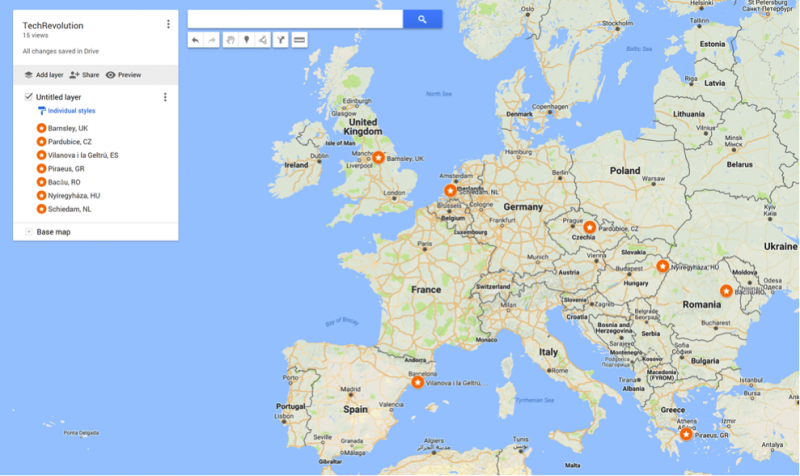
TechRevolution is all about sharing the knowledge, experience and (perhaps most importantly) lessons from Barnsley and learning from others so as to support next steps locally.
All the transfer partners are medium sized towns or cities, seeking to revolutionise their local economy through the development of tech and digital jobs and entrepreneurship. They all want (and need) to transform their economies from being heavily reliant on traditional industry to supporting the development of high value, knowledge-based jobs within the ‘next economy’. They all also have significant learning and experience of their ow which will contribute to enhancing Barnsley’s existing work and developing it into a new Innovation Campus which, it is hoped, will move from conception to inception over the course of the 2-year transfer network.
Zooming in on Pardubice (CZ) and Vilanova I la Geltru (ES)
This section zooms in on two of the transfer partners and serves to illustrate examples of local contexts and ambitions for TechRevolution.
Pardubice
Pardubice lies on the river Elbe, 124 kilometres east of Prague. It has a strong manufacturing sector including the Synthesia chemical factory (manufacturer of Semtex, a plastic explosive) and automotive and engineering plants. It has a population of 90,352.
The city wants to gain new knowledge and skills to develop its co working and incubation offer and, more specifically, to inform the development of its newly opened city centre incubation building (P-Pink).
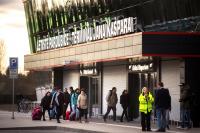
Every other region in the Czech Republic offers co working or incubation space for start-ups. There have been 2 previous attempts to create an incubation-type facility for city start-ups (in 1991 and 2008). Both failed and this is thought to be because they provided little other than a physical space for small businesses with no wider start-up support or community offer.
P-Pink opened in March 2018 and, against a slightly nervous backdrop, has clear plans in terms of occupancy and community. It has recruited a wide network of mentors and opened its doors to start-ups in June 2018, following a few months focusing on branding and marketing. Since 2016 the city has also been involved in the development of a Smart Accelerator, led by the Region, and focusing on creating the conditions in which innovation and entrepreneurship can flourish.
Pardubice wants to use TechRevolution to:
- Contribute to the development of an effective start-up ecosystem – a functional system of business incubation
- Inform the development and operation of a business incubator (P-PINK) with a strong community and start-up support offer, an incubation programme and co-working space
- Explore opportunities to move P-Pink into a position where it might be financially independent of public sector support
- Better understand the tech and digital sector so as to support the growth of tech entrepreneurship and higher value local jobs, linked where possible to manufacturing
- Better understand the ‘customer’ and how to develop effective and meaningful relationships and networks with them and other ecosystem stakeholders
Vilanova I la Geltru
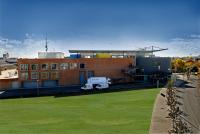
On the coast, south of Barcelona, Vilanova I la Geltru has a population of 66,077, a close relationship with the sea and a strong industrial heritage.
The city wants to transform its economy from one which historically was reliant on traditional sectors to one with a range of high quality digital and creative start-ups jobs for all citizens. It sees innovation and creativity as central to success. Since 2008 it has run the Neàpolis building, which houses local TV and radio, film sets, an auditorium, a research centre, a ‘hotel’ for companies, an incubator and a co-working space. In this period it has hosted 15 SMEs in the ‘hotel’, 9 Micro SME’s in the incubator and 11928 entrepreneurs supported. The building is now at full capacity and the city needs to consider both follow-on space and a wider community entrepreneurship offer.
It wants to use TechRevolution to:
- Improve the delivery, quality and accessibility of its services to local entrepreneurs
- Explore the development of new spaces and places for digital and creative entrepreneurs including re-use of old buildings to contribute to a strategy which includes pre-co-work and follow-on space so there is something for all entrepreneurs and SMEs at every stage of their journey
- Explore how to use digital platforms and communities to improve support for entrepreneurs or businesses
- Engender more of a sense of community amongst creative entrepreneurs and a ‘pay it forward’ culture e.g. by testing different, maybe more informal, community offers or events
- Contribute to the city’s internationalisation and optimise local opportunities from international networks
- Develop new better skills and capacities to drive forward, and govern, innovation e.g. develop more of an appetite for risk, more collaboration
- Further develop Neàpolis’s reputation locally and develop and strengthen local relationships and networks
Exciting times ahead – the art of the possible
TechTown’s mantra of ‘adapt or die’ continues to resonate in these fast-moving times where cities of all sizes need to better understand the opportunities offered by digital and tech and jump on them to grow higher value jobs and start-ups for local people.

In Europe’s small and medium sized cities, the challenge is greater. These places are at risk of being ‘eaten up’ by their larger counterparts which act as magnets and naturally attract clusters of higher growth businesses. They are also home to industries often most prone to automation and machine learning advancement, which will inevitably mean rapidly changing economic and skills requirements.
It is hoped that TechRevolution will provide a safe, constructive, fun and honest space in which to have difficult conversations and structured exchanges about what is actually realistic and achievable in cities like these. Phase 2, which starts in December 2018, will comprise a mixture of full network activity, unpicking different elements of the good practice, and bilateral activity where individual transfer cities can access ongoing support and advice to facilitate the effective and meaningful transfer of good practice and achieve impact on the ground.
Small and medium sized cities need to think differently about their future. They need to dare to dream and believe in the art of the possible.
"We have a real advantage in small and medium cities – we can, and should, be agile and nimble. We can innovate and trial ideas in a way larger cities can’t. We’re looking forward to working with our partners to discover the art of the possible!" Tracey Johnson, Lead Partner, TechRevolution

